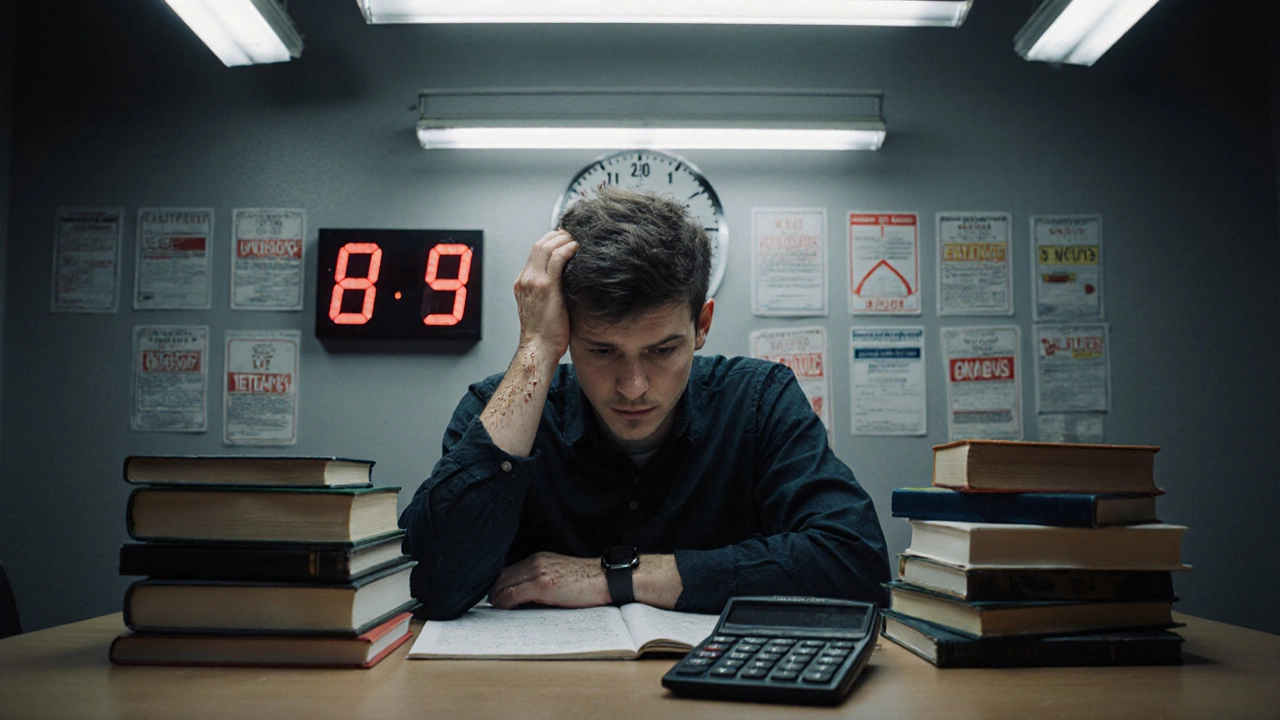Which State Has the Hardest Tests? Top Competitive Exams in the U.S. Ranked by Difficulty
 Nov, 18 2025
Nov, 18 2025
State Exam Difficulty Comparison Tool
When people ask which state has the hardest tests, they’re usually not talking about high school finals. They’re asking about the most brutal competitive exams in the world-exams that decide whether you become a doctor, engineer, government officer, or get left behind. And while the U.S. doesn’t have a single nationwide exam like India’s UPSC or JEE, the hardest tests are concentrated in a few states where competition is fierce, preparation is grueling, and failure rates are brutal.
California: The Engineering Gauntlet
California’s FE (Fundamentals of Engineering) exam pass rate hovers around 65%, but that’s misleading. In reality, the real test isn’t the exam-it’s getting to the exam. To sit for the FE in California, you need a four-year ABET-accredited engineering degree, plus a year of supervised work experience under a licensed engineer. Most candidates spend 8-10 months preparing, studying 20+ hours a week. The exam itself covers eight subjects: mathematics, ethics, statics, dynamics, fluid mechanics, thermodynamics, materials science, and electrical circuits. You can’t use a calculator you’re familiar with-you’re given a standardized one. And if you fail, you can’t retake it for 90 days. In 2024, over 12,000 engineers in California took the FE. Only 6,300 passed. That’s a 48% failure rate. No other state has this kind of bottleneck.
Texas: Medical Licensing Hell
Texas doesn’t have the most medical students, but it has the toughest path to becoming a licensed doctor. The USMLE Step 1 and Step 2 CK are national exams, but Texas has the lowest pass rate for international medical graduates (IMGs). Why? Because Texas requires IMGs to complete a full year of clinical training in a Texas hospital before even being eligible to sit for the exams. Many IMGs come from India, Pakistan, and the Philippines, where medical education is rigorous but doesn’t align with U.S. standards. In 2024, only 58% of IMGs passed Step 1 on their first try in Texas-compared to 82% for U.S. graduates. Add in the cost: $2,600 per exam, plus $30,000+ in relocation and living expenses. Many candidates work two jobs while studying. Some wait years to get a residency spot. The pressure breaks people.
New York: The Civil Service Wall
If you want to work for New York City government, you don’t just apply. You survive a gauntlet. The NYC Civil Service Exams for roles like police officer, firefighter, or corrections officer are legendary for their difficulty. The written test for NYPD recruits covers reading comprehension, logical reasoning, situational judgment, and basic math-all under 90 minutes. But the real killer? The physical fitness test. Candidates must complete a 1.5-mile run in under 12 minutes, 30 push-ups, 40 sit-ups, and climb a 6-foot wall. Only 18% of applicants pass all parts in one attempt. And that’s just to get on the eligibility list. The hiring process can take 18 months. Thousands apply. Hundreds get hired. In 2024, over 25,000 people applied for 1,200 NYPD openings. That’s a 4.8% acceptance rate. No other state has a civil service system this selective.
Florida: The Pharmacy Exam Trap
Florida’s MPJE (Multistate Pharmacy Jurisprudence Exam) is not the hardest pharmacy exam in the U.S.-but it’s the most unpredictable. Why? Because Florida has its own pharmacy laws that change every year. Unlike other states that use a standardized national version, Florida’s MPJE includes 120 questions on state-specific regulations: controlled substance rules, prescription refill limits, pharmacist liability, and telepharmacy guidelines. The exam is computer-adaptive, meaning if you answer one question wrong, the next one gets harder. The pass rate? 62%. But here’s the catch: if you fail twice, you’re forced to retake the entire NAPLEX (national pharmacy exam) before trying again. That’s a $500 fee each time. Many Florida pharmacy students spend six months just memorizing state laws. Some hire tutors who specialize only in Florida’s rules. It’s not about knowledge-it’s about memorizing legal minutiae that don’t exist anywhere else.

Massachusetts: The Law Exam That Breaks People
Massachusetts has one of the lowest bar exam pass rates in the country. In 2024, only 61% of first-time takers passed. Compare that to California’s 69% or New York’s 78%. Why? Massachusetts doesn’t just test your knowledge of law-it tests your ability to write like a judge. The essay portion requires you to apply complex legal principles to hypotheticals with no clear right answer. The exam uses Massachusetts-specific case law that’s not covered in standard bar prep courses. You can’t rely on Barbri or Kaplan alone-you need a Massachusetts-specific tutor. And if you fail? You can’t retake it for six months. Many candidates take the exam three times before passing. Some quit law altogether. The state doesn’t make it easy on purpose. It’s designed to filter out those who aren’t prepared to handle the weight of legal responsibility.
Why These States Are Different
What these states have in common isn’t just high standards-it’s structure. They don’t just have hard tests. They have systems designed to limit access. California limits engineering licenses to protect public safety. Texas filters out underprepared doctors. New York keeps police forces small and elite. Florida protects its pharmacy market. Massachusetts ensures only the most meticulous become lawyers.
Other states like Ohio, Illinois, or Georgia have tough exams too-but they don’t have the same combination of high stakes, low pass rates, and bureaucratic barriers. In those states, if you study hard, you usually pass. In California, Texas, New York, Florida, and Massachusetts, studying hard isn’t enough. You need strategy, timing, mental resilience, and often, financial backing.
What Happens If You Fail?
Failing one of these exams doesn’t mean you’re not smart. It means the system is designed to make you earn your spot. Many candidates in California retake the FE exam three times. In Texas, IMGs often move to states with easier licensing rules, get licensed, then come back. In New York, some applicants become security guards or delivery drivers while waiting for the next civil service exam cycle. The emotional toll is real. Depression, anxiety, and burnout are common. But so is success. Every licensed engineer in California, every NYPD officer, every Florida pharmacist who passed the MPJE on the third try-they all know the cost. And they all say the same thing: it was worth it.

Is There a Pattern?
Yes. The hardest tests are in states with large populations, high demand for professional roles, and strict public safety laws. They’re not random. They’re calculated. The goal isn’t to keep people out-it’s to make sure only those who can handle the pressure get in. If you’re preparing for one of these exams, know this: you’re not just studying for a test. You’re training for a career that demands more than knowledge. It demands endurance.
What Can You Do?
If you’re aiming for one of these exams:
- Start early-six months minimum
- Use state-specific prep materials, not generic ones
- Join a study group with people who’ve passed before
- Take at least three full-length practice exams under timed conditions
- Don’t skip the physical or psychological prep-these exams are marathons
- Know the retake rules. Some states limit how many times you can try
There’s no shortcut. But there is a path. And thousands walk it every year.
Which state has the hardest civil service exam?
New York has the hardest civil service exam in the U.S., especially for roles like police officer, firefighter, and corrections officer. The exam includes a written test, physical fitness test, background check, and psychological evaluation. Only about 18% of applicants pass all parts in one attempt, and the hiring process can take over a year.
Is the UPSC harder than U.S. exams?
Yes, the UPSC Civil Services Exam in India is widely considered harder than any U.S. exam. It has a pass rate under 0.2%, requires mastery of 9 subjects, includes a personality interview, and takes over a year of full-time preparation. While U.S. exams like the FE or bar exam are tough, UPSC is on another level in terms of volume, depth, and competition.
What’s the hardest professional exam in the U.S.?
The Massachusetts Bar Exam is the hardest professional exam in the U.S. based on pass rates and structure. With a 61% first-time pass rate in 2024, it requires deep knowledge of state-specific case law and exceptional essay-writing skills. Many candidates fail multiple times before passing.
Do other countries have harder exams than the U.S.?
Yes. Countries like India (IIT JEE, NEET, UPSC), South Korea (college entrance exam), and China (Gaokao) have exams with far lower pass rates and higher stakes. For example, IIT JEE has a 1% acceptance rate, and Gaokao determines your entire future in one three-day test. These exams are more intense than anything in the U.S. because they’re the only path to elite careers.
Can you retake these exams if you fail?
Yes, but with restrictions. California limits FE retakes to once every 90 days. Massachusetts requires a six-month wait for the bar exam. Florida forces you to retake the national NAPLEX if you fail the MPJE twice. Always check the official state board rules before you start studying.
Are these exams worth the effort?
For most who pass, yes. A licensed engineer in California earns over $110,000 a year. A NYPD officer starts at $55,000 with benefits and overtime. A pharmacist in Florida can make $130,000+. These exams are gatekeepers to stable, well-paying careers. The struggle is real, but the reward is real too.
Final Thought
The hardest tests aren’t about how much you know. They’re about how much you’re willing to sacrifice. The people who pass don’t have perfect scores. They just never gave up.